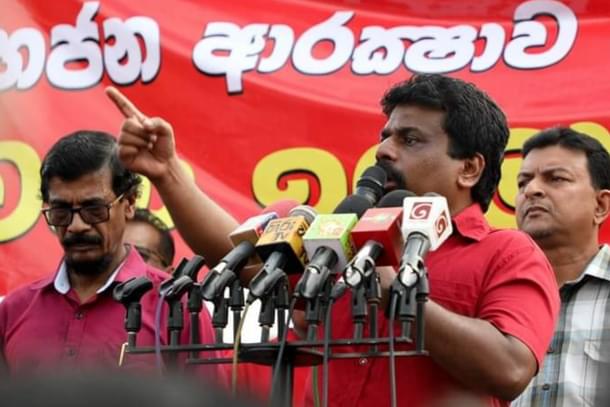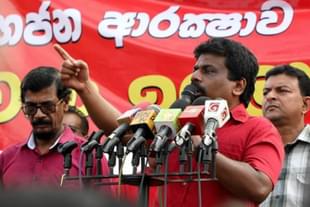World
Sri Lanka Presidential Election Today: This Marxist Leader's Victory Could Upend A Fragile Lankan Economy
Prasenjit K Basu
Sep 21, 2024, 10:01 AM | Updated Sep 27, 2024, 05:11 PM IST
Save & read from anywhere!
Bookmark stories for easy access on any device or the Swarajya app.


As Sri Lankans vote in a presidential election on Saturday (21 September), the island nation again stands at a crucial economic crossroads.
Having become the first Asian nation in at least three decades to default on its sovereign debt in 2022, Sri Lanka’s economy has been painfully restored to stability by incumbent President Ranil Wickremasinghe, while remaining vitally dependent on the International Monetary Fund's (IMF) goodwill and funding support.
But the latest poll suggests that Anura Dissanayake, leader of the Janatha Vimukthi Peramuna (People’s Liberation Front), Sri Lanka’s Marxist-Leninist communist party, is well-positioned to win the race.
The two main centre-right candidates, Sajith Premadasa and Wickremasinghe, trail in second and third place, respectively. Namal Rajapaksa (son of Mahinda Rajapaksa, who won the civil war against the Liberation Tigers of Tamil Eelam (LTTE), then borrowed unsustainably from China and elsewhere) trails in fourth with just 5 per cent support.
There is a caste element to Dissanayake’s appeal. While the JVP has traditionally appealed to the dispossessed in Sri Lankan society, Dissanayake himself (although from a working-class family) happens to be from the ‘goigama’ caste, the largest Sinhala group to which all but one of Sri Lanka’s leaders have belonged. (The goigama are equivalent to Yadavs, Vokkaligas, or Jats — the traditional agricultural caste — but are on top of the unique Sinhala caste order.)
Premadasa’s father, Ranasinghe Premadasa (prime minister from 1978 to 1988, president from January 1989 until his assassination in May 1993), was the only non-goigama leader of Sri Lanka — a ‘dobi’, one of the lowest in the caste hierarchy. That may be an implicit factor placing a ceiling on Premadasa’s electoral strength.
If no candidate gets more than half the votes cast, the two leading candidates are allocated second- and third-preference votes of all the remaining candidates. Most previous polls from the same impartial agency had shown Dissanayake and Premadasa closely tied at between 32 and 37 per cent, with one poll (June 2024) showing Premadasa leading Dissanayake 43 per cent to 30 per cent. The poll conducted in the first fortnight of September, however, gave Dissanayake 48 per cent, Premadasa 25 per cent, and Wickremasinghe 20 per cent of the vote.
If the actual voting is along those lines, the JVP is likely to gain national power for the first time. This would be an astounding result, as the communist party has never won more than a tenth of the nationwide vote in any previous parliamentary or presidential election. Whatever fleeting tastes of power JVP had in the past were in coalition with the centre-left SLFP (Sri Lanka Freedom Party), founded by SWRD Bandaranaike in the 1950s and inherited by his family in subsequent decades.
The SLFP has faded politically, although its machinery was appropriated by the Rajapaksa clan, which has since 2015 renamed its faction of the party SLPP. The rump of the SLFP (led by Maithripala Sirisena, who was president from 2015 to 2019) is supporting Wickremasinghe in this election.
The SLPP’s Gotabaya Rajapaksa (Mahinda’s brother) won the last presidential election in 2019, with 52 per cent of the vote, to 42 per cent for Premadasa. SLPP also retains the parliamentary majority it won in 2020. However, Rajapaksa led Sri Lanka into the abyss of a sovereign default in April 2022, following which economic chaos ensued as inflation soared and fuel supplies turned scarce, leading to riots that caused Rajapaksa to flee the country.
Wickremasinghe, a masterful behind-the-scenes political operative with a distressing inability to win elections, became president in July 2022 with SLPP support, beating Premadasa in a parliamentary vote. Wickremasinghe, the leader of the conservative United National Party (UNP), had split with Premadasa before the 2020 parliamentary election. While Premadasa’s party finished second in that election, Wickremasinghe’s UNP won just a single parliamentary seat, his own.
Within weeks of the sovereign default, the Sri Lanka rupee collapsed from 200 per United States (US) dollar to nearly 370 rupees per dollar. This exacerbated inflationary pressures, but President Wickremasinghe raised interest rates, undertook key fiscal reforms (rescinding Rajapaksa’s tax concessions, reining in spending, and reforming energy prices to ensure cost-recovery), and began stabilising the economy. His efforts were rewarded with the IMF approving a US$3 billion Extended Fund Facility in March 2023, Sri Lanka’s seventeenth IMF program.
The depreciated Sri Lanka rupee (which is still at 305 rupees per dollar) has restrained non-essential imports, boosted exports, and improved tourist inflows. Consequently, the current account swung from a deficit of 1.8 per cent of GDP in 2022 to a surplus of the same amount in 2023. Foreign exchange reserves have rebounded from a trough of US$2 billion to US$5.7 billion, sufficient to pay for 3.75 months of imports. However, Sri Lanka’s massive foreign debt (totalling US$55.38 billion in March 2024 and still rising) remains a huge burden.
In order for creditors to keep rolling over Sri Lanka’s short-term external debt of nearly US$9 billion, the continuance of the IMF program is essential. The JVP’s Dissanayake has gained popularity by attacking the IMF, saying the terms need to be renegotiated. He has promised to cut income tax rates and eliminate value-added tax (VAT) on ‘essentials’ like food, health, and educational services, while increasing taxes on the wealthy (but supporting their businesses!). The wide-ranging tax cuts proposed by Dissanayake would immediately jeopardise the IMF program.
Sri Lanka’s creditors (China being the largest) have to hope that the conservative Premadasa (a London School of Economics graduate and former intern to the pro-India US Senator Larry Pressler) or Wickremasinghe are able to win today’s election. The alternative would entail a renewal of economic chaos.
Prasenjit K. Basu is an economist and the author of 'Asia Reborn'.





